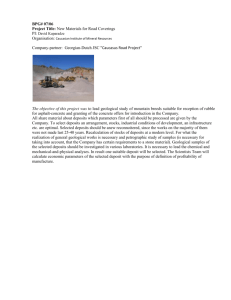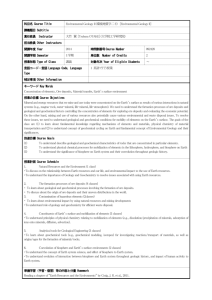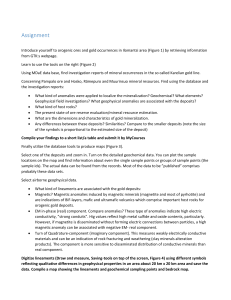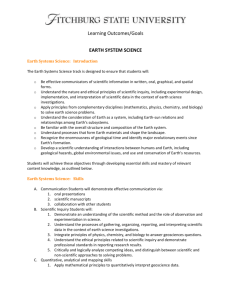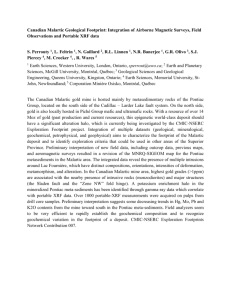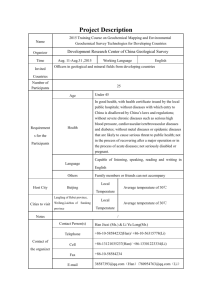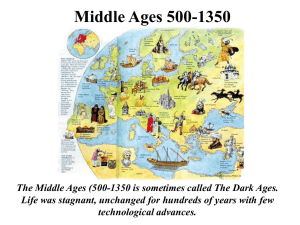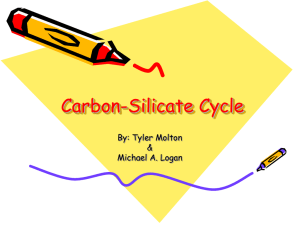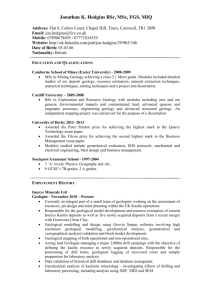SYLLABUS
advertisement
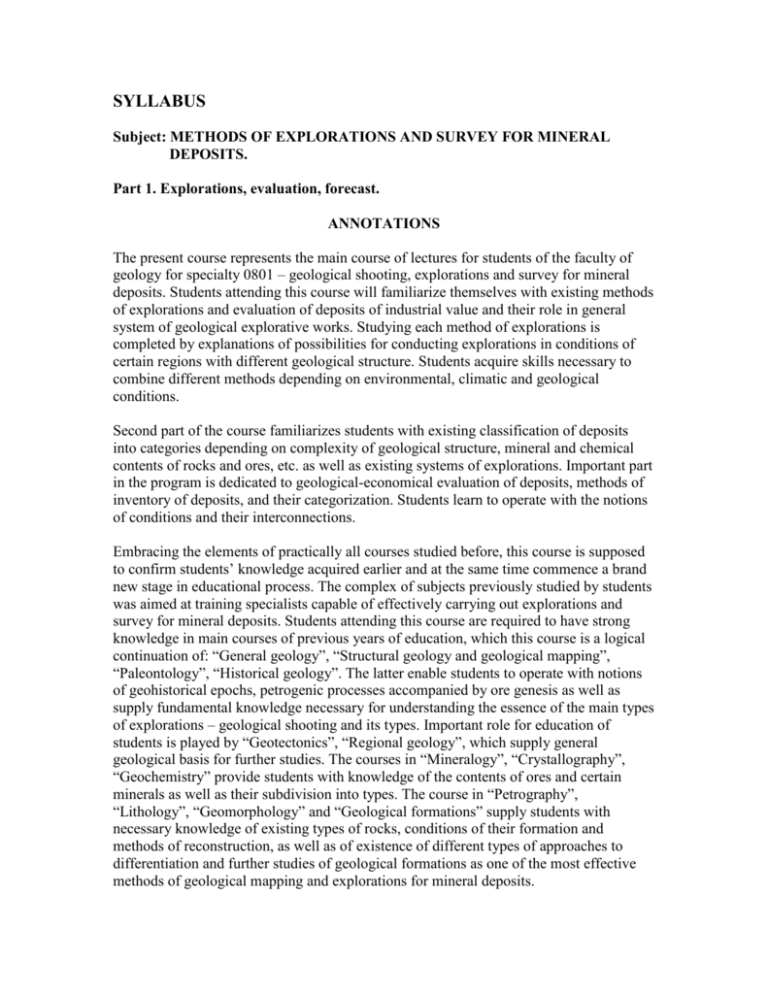
SYLLABUS Subject: METHODS OF EXPLORATIONS AND SURVEY FOR MINERAL DEPOSITS. Part 1. Explorations, evaluation, forecast. ANNOTATIONS The present course represents the main course of lectures for students of the faculty of geology for specialty 0801 – geological shooting, explorations and survey for mineral deposits. Students attending this course will familiarize themselves with existing methods of explorations and evaluation of deposits of industrial value and their role in general system of geological explorative works. Studying each method of explorations is completed by explanations of possibilities for conducting explorations in conditions of certain regions with different geological structure. Students acquire skills necessary to combine different methods depending on environmental, climatic and geological conditions. Second part of the course familiarizes students with existing classification of deposits into categories depending on complexity of geological structure, mineral and chemical contents of rocks and ores, etc. as well as existing systems of explorations. Important part in the program is dedicated to geological-economical evaluation of deposits, methods of inventory of deposits, and their categorization. Students learn to operate with the notions of conditions and their interconnections. Embracing the elements of practically all courses studied before, this course is supposed to confirm students’ knowledge acquired earlier and at the same time commence a brand new stage in educational process. The complex of subjects previously studied by students was aimed at training specialists capable of effectively carrying out explorations and survey for mineral deposits. Students attending this course are required to have strong knowledge in main courses of previous years of education, which this course is a logical continuation of: “General geology”, “Structural geology and geological mapping”, “Paleontology”, “Historical geology”. The latter enable students to operate with notions of geohistorical epochs, petrogenic processes accompanied by ore genesis as well as supply fundamental knowledge necessary for understanding the essence of the main types of explorations – geological shooting and its types. Important role for education of students is played by “Geotectonics”, “Regional geology”, which supply general geological basis for further studies. The courses in “Mineralogy”, “Crystallography”, “Geochemistry” provide students with knowledge of the contents of ores and certain minerals as well as their subdivision into types. The course in “Petrography”, “Lithology”, “Geomorphology” and “Geological formations” supply students with necessary knowledge of existing types of rocks, conditions of their formation and methods of reconstruction, as well as of existence of different types of approaches to differentiation and further studies of geological formations as one of the most effective methods of geological mapping and explorations for mineral deposits. The lectures in the following course “Mineral deposits”, “Thermal Barro Geochemical methods of explorations”, “Geochemical and Mineral-petrographic methods of explorations”, “Economics of mineral resources”, “Geophysics”, “Metalogenics”, “Ore formations” allow to prepare students for understanding the process of finding mineral deposits, determining their geological industrial type, ore formations constituting them, their place in the structure of the Earth’s crust (“Geotectonics”, “Structures of ore fields”), methods for establishing and means – (“Technology of explorations”), as well as ways of forecast, negative consequences of industrial mining (“Monitoring of geological environment”, “Social ecology”). 2. Contents of the Program. 1. Topic: Contents and role of studies in the field of explorations for mineral deposits. Aims, tasks and objects of research. Definition of industrial types of deposits. Main fundamental principles of explorations and survey: completeness of research, sequences of findings, evenness of observations, economy of labour resources, material resources and time management. Interconnection of principles, their unity and contradiction. Constructive consequences of struggle amongst the principles and creation of fundamental notions of explorative geology in the result of this struggle: rational complex of research methods, optimal unity of explorative and survey schemes, division of geological explorative works into stages, etc. 2. Topic: Tasks and contents of geological explorative works Characteristics of objects of explorations from geochemical, mineralogical, petrographical and formational points of view. Stages of geological explorative works. Role of explorations in the systems of geological research, principles of conduction, tactics and organization. Abilities of mineralogical, petrographical and geochemical methods in each stage. 3. Topic: Forecast for mineral deposits Definition of explorative criteria and indicators. Main differences and cases of mutual transformation. Explorative criteria: stratigraphic, facial-lithological, structural (tectonic), magmatic, formational, characteristics of changes in round ore space, geochemical, geomorphological, metamorphic, hydro-geological, geophysical, etc. explorative indicators, their classification, informativeness, explorative value and practical importance. Formations of hydro-thermally changed rocks and their ore-bearing. Zones of metamassifs and their connections with ore-bearing. Minerals-indicators of ores. Their typomorphic peculiarities, geochemistry. Hypergenic changes: mineral and geochemical transformations of minerals within zones of hypergenesis. Mineralogical and geochemical areas of dispersion and their explorative value. Forecast for mineral deposits using complex of formational, petrographical, mineralogical, structural and other criteria and indicators. Forecast for “buried” ore-bearing deposits. Evaluation of forecasting resources and their categorization. 4. Topic: Explorations and evaluation of mineral deposits. Petrographic research at the time of geological shooting. Mineralogical and geochemical mapping. Testing and studying exfoliated mineral deposits, their evaluation according to the complex of mineralogical-petrographic features. Methods of explorations, their classification and applications in different stages of geological explorative works. Role of geochemical methods of explorations in the general system of explorative works. 5. Topic: Geochemical methods of explorations. Evaluation of occurrence in natural formations. Forms of elements found in the Earth’s crust (independent mineral species, isomorphic mixtures in minerals, biogenic forms, water solutions, colloids with liquid dispersion environment, gas mixtures, technogenic unions not found in natural conditions, magmatic fusions, state of dispersion). Geochemical migration of elements. Types and kinds of migration. Internal and external factors of elements migration. Geochemical field and its local anomalies. Main statistic parameters of subdivision and their evaluation for practice of geochemical explorations. Definition of landsite, its types. Landsite-geochemical zoning. 6. Topic: Primary geochemical areols. Peculiar features of contents and structure (contents of elements, dimensions and intensity, peculiarities of morphology and zoning). Classification of primary areols, conditions of their formation, connection with products of its destruction in hypergenic conditions. Peculiar features of explorations for primary areols. Evaluation of the level of erosive cross-section and scale of ore-bearing. 7. Topic: Secondary geochemical areols. Conditions for formation and classification of secondary areols. (open, closed, residual, applied, torn, diffusive, and diffusive-defluction, shift and land-slip, delluvial and suffosia, uninterrupted, super ore and mixed. Peculiarities of conduction of geochemical explorations for secondary areols. Evaluation of forecasting resources for secondary areols. 8. Topic: Dispersion flows Interrelation of primary and secondary areols of dispersion. Peculiarities of conduction of explorations for dispersion flows. 9. Topic: Statistic parameters of subdivision Calculation of background, minimal abnormal contents of chemical elements. Contrast of geochemical anomalies. Zoning of areols. Rows of chemical elements arrange by order. 10. Topic: Productivity of areols of dispersion Calculation of linear and flat productiveness of areols. Evaluation of forecasting resources and main ways for determining productivity of dispersion areols. 11. Topic: Maps featuring laws of occurrence of mineral deposits Principles for compiling and analysis. Forecast on their basis. Forecasting drawbacks.
